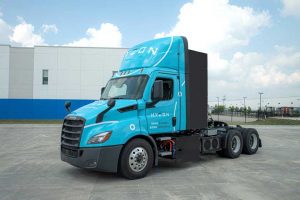Hyzon Motors, a manufacturer of hydrogen-powered commercial vehicles founded in Singapore (IPO via special-purpose acquisition company, SPAC, in New York), saw its the share price crash after a hedge fund named Blue Orca (a short seller?) leveled various accusations, including that an order for 20 Hyzon trucks did not come from the named customer, Hiringa Energy, but from someone completely different. Moreover, it also prompted questions about an agreement (memorandum of understanding) concerning 400 trucks for a Chinese customer. Law firms simultaneously added a string of class action lawsuits whose aim and purpose is unclear to me, though. Did someone want to initiate a lower IPO price or make stock prices tumble by short selling?
The price fell from USD 10 to USD 5 in any event. Still, like Nikola Motor, the company continues to calmly implement its business plan so there are now production sites in Asia, Europe and the USA. Shanghai Hydrogen HongYun Automotive has placed an order for 62 trucks. TC Energy signed an agreement to supply hydrogen – Nikola even agreed this with TC Energy – to jointly provide hydrogen refueling stations and also hydrogen. Planning is in full swing on a joint pilot project with Zhangjiagang Haili Terminal, a subsidiary of the fourth largest steel corporation in the world, Sha Steel Group.
With Itochu, planning has started for the deployment of fuel cell systems made by Hyzon in mining vehicles. Added to that, its partner, Hiringa, in New Zealand obtained an investment from the Japanese corporation Mitsui to expand its hydrogen infrastructure. From Australia came the news that prototypes of heavy trucks made by Hyzon for Ark Energy in Queensland have won funding from two governmental agencies.
By the end of the year, a total of 85 vehicles should have been delivered and driving on the roads of the USA, Europe, Australia and Asia. Production sites in Rochester, NY/USA, and the Netherlands, among others, will be expanding on schedule, according to reports. Hyzon had about USD 500 million cash in the bank as at Sept. 30, 2021. About 247.5 million shares had been issued up to this date, valuing the company at below USD 2 billion.
Conclusion: Hyzon is building on the experience it gained throughout 20 years in fuel cell technologies and hydrogen management for the deployment in commercial vehicles. Compared with Nikola, this Asian company is an interesting player in this sector that primarily benefits from fuel cells and hydrogen in heavy trucks (according to McKinsey, more than 70 percent of heavy trucks will be running on hydrogen by 2050). Interesting as a speculative investment even if class action lawsuits still make for uncertainty and may also give rise to costs. These costs must ultimately be paid for by their own shareholders, meaning that some class actions should be examined closely and treated with caution, at least that is my feeling.
Risk warning
Share trading can result in a total loss of your investment. Consider spreading the risk as a sensible precaution. The fuel cell companies mentioned in this article are small- and mid-cap businesses, which means their stocks may experience high volatility. The information in this article is based on publicly available sources, and the views and opinions expressed herein are those of the author only. They are not to be taken as a suggestion of what stocks to buy or sell and come without any explicit or implicit guarantee or warranty. The author focuses on mid-term and long-term prospects, not short-term gains, and may own shares in the company or the companies being analyzed.
Written by Sven Jösting December 7, 2021

























0 Comments